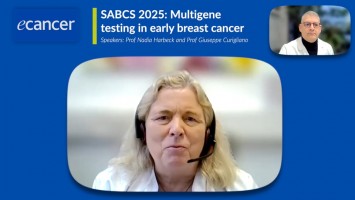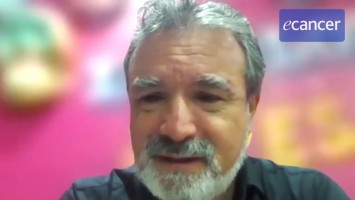This is a very exciting new area of multi-cancer early detection. Several companies are actually developing blood tests that can detect cancer in people who don’t yet have cancer. I was asked to be a discussant for two abstracts, and there are actually many abstracts here looking at these multi-cancer early detection tests.
The studies that we evaluated and discussed were two studies that were case-cohort studies, large cohorts of individuals, some with cancer, some without. They looked at how easily or how well they did at identifying a cancer signal in those patients with cancer who didn’t yet have treatment.
The interesting thing is that although some of these tests are being marketed, and you can pay for them and patients are asking for them, we don’t yet have clinical utility. We don’t know quite how to incorporate them into our lexicon of cancer screening. We have five proven modalities to screen for cancer, for breast, cervical, lung, prostate, colon, and how do we bring these tests into that is a little unknown. The issue, or one of the findings that we saw with these two studies, is that the signal detection rate for early stage cancer – stage I and stage II – was quite low, at about 25%. Even in the prospective studies – people who enter this study, don’t have cancer, they get this test, we follow them up – the ability to detect early cancer, stage I and stage II, is still quite low.
Although the promise of a blood test to identify cancer early is so intriguing and may actually be something that can be disseminated easily and widely, we still have a lot of work to do. We have to get better signal detection, the cost needs to come down. This could actually be helpful for countries where you can’t set up mammography or low-dose CT or colonoscopy, so I think it’s quite an exciting area, but it’s still early and really working on the clinical utility is the next step.
There's going to be a large study funded by the NCI that will be a feasibility study of doing just standard of care screening, versus one MSAT test, versus another MSAT test, so the two companies have been identified. Enrolment will start in probably June; it is June already. We hope to enrol 2,800 individuals to see if a large test like this can actually be done. Then we’ll go to the next step which will be a study looking at cancer mortality: can you improve cancer mortality by doing a test like this?








